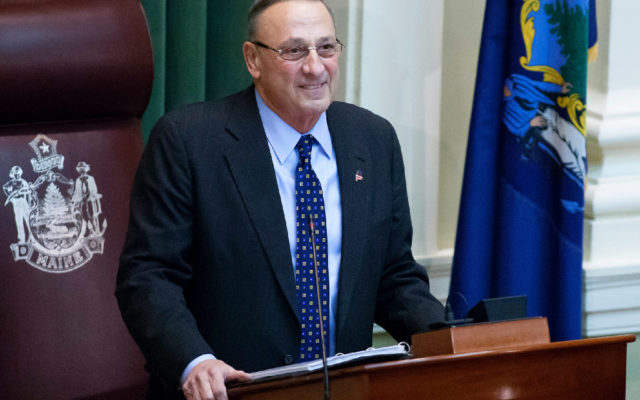
Maine GOP takes initial step to clear path for Paul LePage return bid
By Michael Shepherd, Bangor Daily News Staff
AUGUSTA — The Maine Republican Party will allow the national party to coordinate with former Gov. Paul LePage immediately after he launches a potential 2022 return bid for the Blaine House in an initial step helping to clear the way for a run.
The move amounts to official recognition that LePage, the state party’s dominant figure who won two terms as governor in 2010 and 2014, has first refusal on his party’s nomination. The 72-year-old has teased a run against Gov. Janet Mills, one of his archrivals in Augusta when she was attorney general, since before he ceded office to the Democrat in early 2019.
Maine GOP Chair Demi Kouzounas and the state party’s other two representatives to the Republican National Committee — lobbyist Josh Tardy and former Assistant House Minority Leader Ellie Espling — signed a letter “in recent weeks” waiving the national party’s Rule 11, which bars it from contributing money or aid to a candidate at least until they are unopposed in a primary, said Jason Savage, the state party’s executive director.
While the party could not bar someone from entering a primary, the move effectively allows LePage to begin campaigning as the party’s nominee with a monopoly on aid from the state and national party arms. Any primary against LePage would be an uphill battle anyhow, since one SurveyUSA poll last year found 71 percent of likely Republican voters would definitely back him.
State party leaders are firmly allied with LePage, including Savage, who rose in state politics as a member of the former governor’s 2010 campaign. The state party recently circulated a form to members urging them to give the former governor feedback on his potential run.
Savage said the rule had not been waived in his time with the party since 2013, but that the circumstances facing the party were unprecedented with a former governor open to returning and an incumbent in Mills who has recently begun fundraising with her party behind her.
“It’s unique, but it’s also necessary if that is the matchup we have and that is the direction we go,” he said. “Then, we’re not going to waste even an hour.”
LePage repeated last year that he is “99.9 percent” likely to run against Mills. In November, his political strategist, Brent Littlefield, said he had no “impending or planned announcement.” On Monday, he provided no more specifics on the timeline but the former governor was buoyed by “thousands and thousands of encouraging and positive messages.”
“He has no announcement to make,” Littlefield said.
LePage left Maine after his tenure to live in Florida, where he registered to vote on the day that Mills was sworn in. He continued to spend summers here — including stints as a bartender in Boothbay Harbor — before declaring residency in Edgecomb ahead of the 2020 election.
The polarizing LePage may enter a race against Mills as an underdog. During his eight years, he topped out at a 47 percent approval rating in 2011. Mills has been consistently above that mark since her 2018 victory. Her rating fell from 67 percent approval last spring on her coronavirus response to 52 percent by February in polling from Northeastern, Harvard, Rutgers and Northwestern universities, although other governors saw slightly larger drops on average.